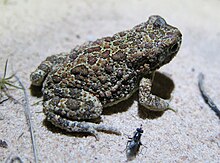Poyntonophrynus
| Poyntonophrynus | |
|---|---|

| |
| Poyntonophrynus fenoulheti | |
| Scientific classification | |
| Domain: | Eukaryota |
| Kingdom: | Animalia |
| Phylum: | Chordata |
| Class: | Amphibia |
| Order: | Anura |
| Family: | Bufonidae |
| Genus: | Poyntonophrynus Frost et al., 2006[1] |
| Type species | |
| Bufo vertebralis Smith, 1848
| |
| Species | |
|
10 species (see text) | |
Poyntonophrynus, also known as pygmy toads, are a genus consisting of ten true toad species native to Sub-Saharan Africa.[2][3] Originally, all Poyntonophrynus species were included in the genus Bufo. The genus was split due to large enough taxonomic divergence as evidenced by molecular markers.[1] The genus is named in honour of John C. Poynton, South African herpetologist, with phrynus being Greek for toad.[1]
Taxonomy and systematics
[edit]Poyntonophrynus corresponds to the former Bufo vertebralis group.[1][2] Poyntonophrynus is the sister taxon of Mertensophryne. Some molecular studies have suggested polyphyly of Poyntonophrynus, but the conclusion is likely to have been caused by sequences representing a different species than assumed.[2]
Description
[edit]Poyntonophrynus are small toads.[4] They lack a tarsal fold, and their parotoid glands are indistinct and flattened. The tympanum is small but distinct.[1]
Species
[edit]The species in this genus are:[2][3]
- Poyntonophrynus beiranus (Loveridge, 1932)
- Poyntonophrynus damaranus (Mertens, 1954)
- Poyntonophrynus dombensis (Bocage, 1895)
- Poyntonophrynus fenoulheti (Hewitt and Methuen, 1912)
- Poyntonophrynus grandisonae (Poynton and Haacke, 1993)
- Poyntonophrynus hoeschi (Ahl, 1934)
- Poyntonophrynus kavangensis (Poynton and Broadley, 1988)
- Poyntonophrynus lughensis (Loveridge, 1932)
- Poyntonophrynus pachnodes (Ceríaco, Marques, Bandeira, Agarwal, Stanley, Bauer, Heinicke, and Blackburn, 2018)
- Poyntonophrynus parkeri (Loveridge, 1932)
- Poyntonophrynus vertebralis (Smith, 1848)
- Poyntonophrynus fernandae (Baptista & Vaz Pinto & Keates & Lobón-Rovira & Edwards & Rödel, 2023)
Sclerophrys urunguensis likely belongs to this genus, but remains formally in Sclerophrys (former Amietophrynus).[5]
References
[edit]- ^ a b c d e Frost, D. R.; Grant, T.; Faivovich, J. N.; Bain, R. H.; Haas, A.; Haddad, C. F. B.; De Sá, R. O.; Channing, A.; Wilkinson, M.; Donnellan, S. C.; Raxworthy, C. J.; Campbell, J. A.; Blotto, B. L.; Moler, P.; Drewes, R. C.; Nussbaum, R. A.; Lynch, J. D.; Green, D. M. & Wheeler, W. C. (2006). "The amphibian tree of life". Bulletin of the American Museum of Natural History. 297: 1–291. doi:10.1206/0003-0090(2006)297[0001:TATOL]2.0.CO;2. hdl:2246/5781. S2CID 86140137.
- ^ a b c d Frost, Darrel R. (2018). "Poyntonophrynus Frost, Grant, Faivovich, Bain, Haas, Haddad, de Sá, Channing, Wilkinson, Donnellan, Raxworthy, Campbell, Blotto, Moler, Drewes, Nussbaum, Lynch, Green, and Wheeler, 2006". Amphibian Species of the World: an Online Reference. Version 6.0. American Museum of Natural History. Retrieved 17 March 2018.
- ^ a b "Bufonidae". AmphibiaWeb: Information on amphibian biology and conservation. [web application]. Berkeley, California: AmphibiaWeb. 2018. Retrieved 17 March 2018.
- ^ Du Preez, Louis H.; Carruthers, Vincent; Burger, Marius (2009). A Complete Guide to the Frogs of Southern Africa. Cape Town: Struik. p. 156. ISBN 978-1-77007-808-6.
- ^ Frost, Darrel R. (2018). "Sclerophrys urunguensis (Loveridge, 1932)". Amphibian Species of the World: an Online Reference. Version 6.0. American Museum of Natural History. Retrieved 17 March 2018.
